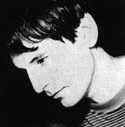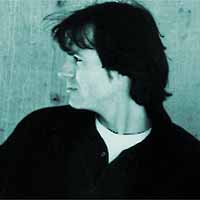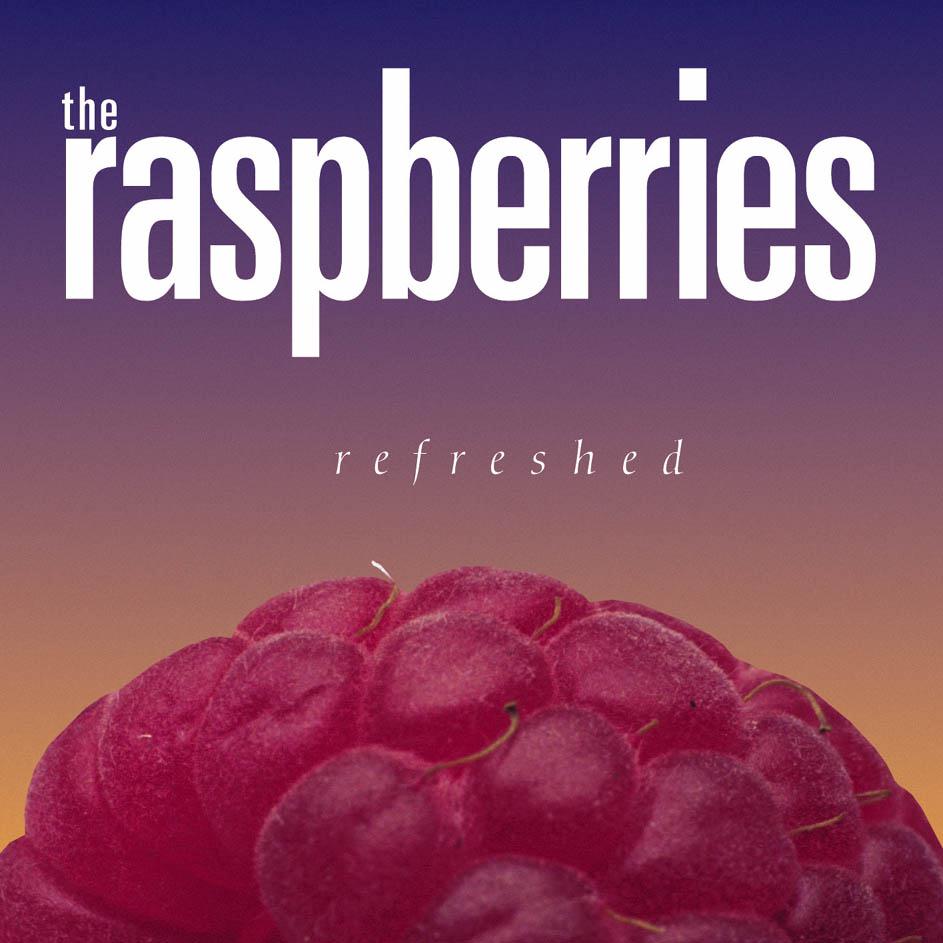The Rocker
Rewind

The Story Of Big Star
Looking back, Big Star seems to be one of the most unfortunate names a band could ever choose. Big Star wanted to conquer the world with beautiful music but they never even came near chart succes. During the band's existence (1971-1975) they only sold a couple of thousands of records. When Alex Chilton decided to call it quits in 1975 it seemed that Big Star's music would be forgotten. Since the end of the seventies however the band's cult-status has grown to nearly mythical proportions. Big Star became a source of inspiration for many rockbands during the 80's and 90's. "#1 Record" and "Radio City" are considered highlights in the powerpop genre while "Sister Lovers/The Third Album" is often mentioned as one of the masterpieces of 70's rockmusic.
The Box Tops
During the mid 60's Alex Chilton regularly played in a band that also featured Chris Bell and Richard Roseborough. At that moment he wasn't sure about starting a music career and so he chose to finish his college-education. Not much later though he joined the band Ronnie and The DeVilles, an R&B-band. Chilton, only 16 years old, became the leader of this band renamed The Box Tops in 1967. Once The Box Tops had built a good reputation in Memphis, their manager (a local DJ named Roy Mack) introduced them at American Sound Studios run by Chip Moman. There they were placed under the guidance of songwriters Dan Penn and Spooner Oldham. It was Dan Penn who chose a demo of the unknown songwriter Wayne Carson Thompson as the group's first single. The catchy song, "The Letter" became a worldwide hit instantly, staying at #1 in the US charts for 4 weeks (september - oktober 1967). With "Cry Like A Baby" they scored another top 10 hit but the follow-up's didn't do as well (top 40 chartings though). Chilton very effectively sang with a gravelly voice on these songs, without sounding strained. On a couple of ballads he showed his sensitive side and used a higher, almost boyish voice. Several changes in personnel followed while Chilton became dissatisfied with his limited influence. He hardly had anything to say about the music. Producers Penn and Moman decided which songs were recorded, who played on them and how they should sound. It took until the third album "Non-Stop" before Chilton could record one of his own songs ("I Can Dig It"). The soulful "Together" and bluesy "I Must Be The Devil" on 4th album "Dimensions" showed Alex's versatility and growing songwriting qualities. The lovable single B-side "I See Only Sunshine" showed his pop sensibility.
Due to the fading succes, busy tourschedules and the fact that Chilton was the only bandmember present during the studio-recordings (backed by American Sound's houseband) the band started to fall apart. When Chilton walked away during a concert in England late '69 and decided not to return again it meant the end of The Box Tops. If the 4 lp's made by The Box Tops are no more than enjoyable at least they gave us a couple of classic R&B popsongs with "The Letter", "Cry Like A Baby" and "Soul Deep". But today they are mostly remembered for introducing Alex Chilton.
Ardent Studios
Chris Bell hung around a lot in the Ardent Studios, owned by John Fry and Terry Manning. Bell and Richard Roseborough worked there occassionaly as engineer or guitarist, amongst others on Manning's solo lp "Home Sweet Home". John Fry was very gracious in allowing everyone at Ardent try something on their own. So, after regular studio-time often local bands rehearsed. One of these bands was called "Rock City". The band was led by Tom Eubanks, a singer-songwriter who had a big batch of songs. The band was completed by Chris on guitar, Jody Stephens on drums and Terry Manning on piano, keyboards. Chris had a couple of song ideas too and the band recorded "My Life Is Right" and "Try Again", later re-recorded by Big Star. The album was finished but remained unreleased until 2003 when Lucky Seven Records released 11 songs plus 2 Eubanks solo-recordings and "Feel" by Chris's next band, Icewater. The cd definitely has some interesting 60's pop/rock but the quality is uneven. Highlights are "Think It's Time To Say Goodbye" and the 2 Bell compositions. In the meantime Chris Bell already played the local circuit with his new band. Icewater also had a former schoolfriend of Bell, Andy Hummel, on bass and Jody Stephens on drums. The band played mostly pub-rock and a couple of Bell's songs.
After The Box Tops fell apart Chilton tried to convince Bell to go to New York and play as a folk-duo. Bell didn't like that idea and Chilton left on his own in 1970. Soon, however, Chilton returned to Memphis, disappointed in his adventure. It did give him time to write some new songs though.
In the Ardent Studios Chilton started the recording of a a solo lp with assistance of Roseborough and Manning. The lp wasn't finished however, it took until 1986 before a couple of these songs appeared on the compilation "Lost Decade" (in 1996 the complete recordings were issued as "1970", see Discography).
#1 Record
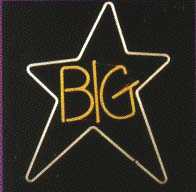
Impressed by some of Bell's demos Chilton decided to join Icewater in 1971. In this new line-up the band started rehearsing while Bell and Chilton wrote new songs. After one of the recording-sessions they noticed a neon-sign of a supermarket near Ardent Studios, Big Star Foodmarkets. Icewater was changed immediately into Big Star.
Early '72 the recordings for an album were finished and in april '72 "#1 Record" was released on the Ardent label. The optimistic title of the lp wasn't so strange considering the quality of the music. "#1 Record" is a beautiful lp for which Bell and Chilton both wrote half of the songs. Influenced obviously by The Beatles, The Byrds and The Kinks. Big Star played pure pop/rock but never sounded anachronistic. "#1 Record" opens terrific with Bell's "Feel" and features highlights such as "The Ballad Of El Goodo", "In The Street", "Thirteen", "Don't Lie To Me", "When My Baby's Beside Me", "My Life Is Right", "Give Me Another Chance" and "Watch The Sunrise". Andy Hummel's only contribution, "The India Song", may be the weakest song on the album but even that is lovely.
Bell's aching and Chilton's clear, boyish vocals take the lead in turn on the perfect production by John Fry. Chilton would keep singing this way. His raw vocals with The Box Tops were producer Dan Penn's idea. "#1 Record"'s lyrics are full of teenage romance. In "Thirteen" Alex sings; "Won't you tell your dad, "Get off my back", Tell him what we said about Paint It Black, Rock 'n Roll is here to stay, Come inside where it's okay, And I'll shake you". And on "In The Street", it's Chris Bell who sings; "Hangin' out, Down the street, The same old thing we did last week, Not a thing to do, But talk to you". Chilton's "Thirteen" brings up associations with Nabokov's "Lolita". Chilton, only 22 years old by then, will declare later that this was a way to return to his teenage years. Due to the succes of The Box Tops when he was only 16 he sort of skipped a couple of years in his youth.
In the early 70's it wasn't fashionable to play pure pop and sing about teenage problems. The musical climate was ruled by bands that played long solo's and sang pretentious lyrics. And, more often than not, lost sight of the essence of pop/rockmusic. It should be fun to listen too. There were a couple of like-minded bands such as The Raspberries and Badfinger but although they scored a couple of hits they were dismissed too easily as 'poppy' or 'lightweight'. Which was untrue 'cause their albums still sound great. Big Star could've been a breath of fresh air here. Were The Raspberries songs may have been a bit too sweet sometimes and Badfinger didn't have the presence of stars, Big Star had it all. They had the songs for it and the personalities too but things didn't turn out that way.
Due to a bad distribution deal with Stax records the album failed to make any impact at all. The label, specialized in Soul music of course, didn't know what to do with Big Star's music and hardly even got the lp in the record stores. The singles "When My Baby's Beside Me" and "Don't Lie To Me" flopped as well because of this. Only 4,000 copies were sold of "#1 Record".

Chris Bell leaves
Especially Chris Bell was devastated by the lack of succes of "#1 Record". Besides writing 5 of the 11 songs, Bell brought his studio experience as an engineer and guitarist. The lp was Bell's vision on popmusic. Bell had the musical concept ready before Chilton joined. Of course Chilton brought his songs and rock 'n' roll attitude and made it happen. Because of Chilton's fame from The Box Tops he got most of the attention, if any. Chris Bell felt underappreciated. The failure of "#1 Record" commercially was an enormous blow for his self-confidence. Dave Bell tried to cheer up his brother with a trip to Europe, but Chris remained unconsolable. When Bell returned to Memphis it became more and more apparent that Chilton wanted to be the leader of the band. Chilton felt Big Star had to become a live-band especially while Bell saw Big Star as a studio-project. Chilton knew that Bell would never give in but pushed through nonetheless. The kindhearted Bell could not handle Chilton's dominant personality. And at the end of '72 a depressed Bell left his own band. In '73/'74 he attempted suicide twice and ended up in the hospital. Once recovered, he went to Europe and tried to get a deal for a solo album.
Radio City
After Bell's departure Big Star played a couple of gigs as a trio but the group seemed to fall apart. Chilton already had plans for a solo career. He was persuaded however to play at a local rock writers convention. In May '73 Big Star made a terrific impression on everyone present with an energetic performance. This gig has since become a legend. Inspired by the positive response Big Star decided to reform. Chris Bell was involved for a while but the old animosities soon surfaced again and Bell left, refusing any credit for work he did. Bell's contributions to "O My Soul", "Way Out West" and "Back Of A Car" can't be singled out on the final result.
"Radio City" appeared in January 1974. The album received raving reviews just like it's predecessor. The critics nearly stumbled on their words. Some even called "Radio City", 'The classic rock album of all time'. Although the melodious guitarpop sound remained pretty much intact, "Radio City" sounds much rawer and spontanious than "#1 Record". A lot of the songs were recorded in a couple of takes. Compared to "#1 Record", what it lacks in sweet pop harmonies is made up by it's urgency and tension. Although "Radio City" may be a little less consistant it's this brittling energy that makes it even surpass the debut in the end.
Opener "O My Soul" sets the tone. The sound is raw, loose, the band sounds unpredictable but still accessible and explosive at the same time. Chilton's guitar playing is a lot more upfront, aggressive and original. "She's A Mover" almost seems to end up in chaos but Jody Stephens' dynamic drumming and Andy Hummel's solid bass playing keep things together. The highlights of "Radio City" are the songs were the combination of melodious pop and rockin' out melts together such as in "Daisy Glaze", "Back Of A Car" and "September Gurls" ("I loved you, well nevermind" would later inspire Nirvana for an album title). Rock music didn't get better than this in the early seventies. While the music on "Radio City" is more energetic and rawer than on "#1 Record", the lyrics are more serious and mature. Chilton's growing consumption of alcohol especially was leaving it's marks. Due to problems between Columbia and Stax, distribution was minimal again and so another great lp went virtually unnoticed. Only 5,000 copies were sold. The disappointment and Chilton's difficult behaviour made Andy Hummel decide to leave and quit the music business altogether.

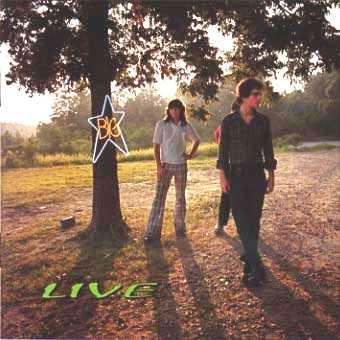
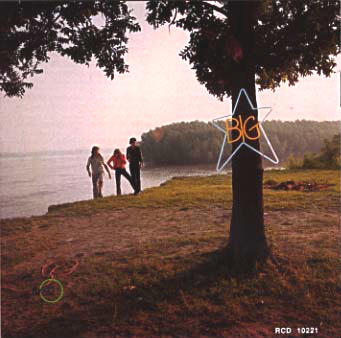
Alex and Jody remained together however and did a short tour on the East Coast with John Lightman on bass. During this tour they also recorded a show for the New York radiostation WLIR-FM. These recordings were released by Rykodisc on cd in 1992 as "Live". During this show the three musicians were able to reproduce the group sound pretty good. Chilton slows down a couple of times for some acoustic songs which suited him well. Unfortunately, the rest of the tour was a disaster. The band played for 5 nights in a nearly empty Max's Kansas City in New York while all of the equipment was stolen in Boston.
The Third Album/Sister Lovers
On their return to Memphis, Chilton and Stephens started work on Big Star's 3rd lp with the help of some experienced session men (a.o. Steve Cropper and Richard Roseborough). The lp had "Sister Lovers" as working title which pointed to the fact that Chilton and Stephens were dating the twin sisters Lesa and Holiday Aldridge at the time. Due to Alex's depressed state of mind the songs were more sombre and personal than ever. He felt that the melodious pop/rock music of Big Star's first 2 lp's didn't fit in with this anymore. This frustated John Fry, who played an important part on "Radio City" keeping Big Star's sound in tact. One of Fry's favourite songs of the sessions (considered as possible single), "Downs", was ruined deliberately by Chilton as an act of revenge. 'I think that Alex's reason, subconsciously, was that he had been exploited so much', stated Jim Dickinson. 'The money from his succes had gone to somebody else, so he was determined that if things were going to be fucked up, he's going to be the one who fucked them up'. Growing arguments between Chilton and Fry also had to do with financial problems. Stax Records bankrupted and left Big Star without a contract. Chilton kept on recording however, hoping he could find another interested record company. The collaboration between Chilton and famous (as well as notorious) producer Jim Dickinson went surprisingly well. Dickinson's rough and impulsive way of working was exactly what Chilton was looking for. Chilton came up with acoustic songs and Dickinson found the right arrangements. Early '75 Chilton ended the recordings when he realized it was no use to continue (there was no contract in sight). His shape, physically and mentally, was becoming a problem as well. Later he would call '73/'74 as his blackest period; 'Whatever was there, I drank it or took it'. The recordings of "Third/Sister Lovers" were never really finished while there's no definitive tracklisting either.
Some songs on "Third/Sister Lovers" still have the Big Star sound pretty much intact. The catchy rocker "Kizza Me", with Dickinson's wild pianoplaying. Or Stephens' lovely "For You" and the deceptively positive but very tongue-in-cheek "Thank You Friends". "Stroke It Noel", with it's beautiful stringarrangement and the sneering "You Can't Have Me" (aimed at the record industry).
All of these songs don't sound that different from Big Star during their first 2 lp's. However great these songs are, it's the depressed, bleak songs that dominate the set and draw the attention. Sometimes the band seems to end abruptly while the use of echo reminds of music for soundtracks. It's the perfect background however to Chilton's confessions and dissapointments. In "Holocaust" he delivers a macabre description of his low self-esteem at the time. Looking at himself in the mirror, he says/sings; 'You're a wasted face, You're a sad old lie, You're a holocaust'. And in "Nighttime" he doesn't sound to happy either; 'Let me out of here, I hate it here'. The bleakest songs on the lp, "Holocaust", "Nighttime", "Take Care" and "Kanga Roo" are also among the best Big Star ever recorded. Chilton wanted to close a period with "Third/Sister Lovers". To do that he decided to destroy Bell's (and Fry's) pop-concept and he turned away from any hopes on fame and fortune as a rockstar. For three years long it was deemed impossible to release this rough, depressed music. It took until 1978 before a first release of these recordings appeared as "Third" on PVC records in the U.S., without the knowledge of Alex. Several bootlegs had already surfaced in the meantime. Not much later Aura Records (England) released a 12 song version as "The Third Album" while the other release had 14 songs. If "Third" may be the strongest of these releases, "The Third Album" had two different songs so it was obvious there were probably more recordings. In 1987 Line records released a 17 song set and in 1992 Rykodisc released a 19 track version which can be seen as the definitive release (although "Dream Lover" should never have been named a 'bonus track').
"Third/Sister Lovers" is an eclectic, sometimes perplexing and often brilliant lp with an emotional depth seldomly heard. Only Neil Young's "Tonight's the night", "John Lennon Plastic Ono Band" and Lou Reed's "Berlin" are comparible to it. All of these albums sound like a cry for help.
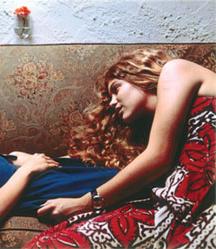
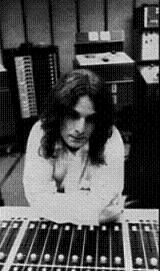
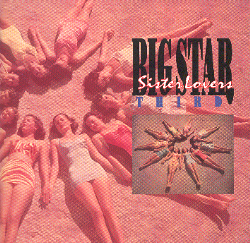
Alex Chilton solo
After Big Star fell apart Chilton went to New York to start a solo-career. Aided by producer John Tiven and Chris Stamey a.o. he released an EP with some decent covers ("Singer Not The Song", 1977) and two strong singles ("Bangkok" and "Can't Seem To Make You Mine"). These songs were later released on the lp "Bach's Bottom". In 1978 he started recording his first true solo-lp, again produced by Jim Dickinson. It's audible that a lot of drugs and booze were absorbed during these sessions. Released in 1980, "Like flies on Sherbert" is a very uneven, messy lp that largely lacks the genius of the Big Star lp's. During the 80's Chilton gets himself together and starts to release decent records with a pleasant mix of Soul, Rhythm & Blues, Pop and Surf-music. But nothing that sounds like Big Star. It seems that Chilton avoids to take risks with his music because he wants to steer away from the problems he had during the period '74-'78. He received a lot of credit for his production of the first Cramps-lp's however.
Cult-status
During the second half of the 70's a small but fanatic group of admirers (mostly journalists and musicians) made sure Big Star wasn't forgotten. This led to the belated release of "The Third Album/Sister Lovers". During the same year (1978) Stax Records released "#1 Record/Radio City" as a 2lp. All this led to more interest for Big Star's music. As a result of Chilton's contribution to "You And Your Sister", the B-side to Chris Bell's magnificient solo 45 "I Am The Cosmos", rumours arose about a Big Star-reunion in the original line-up. Bell and Chilton discussed the possibility of a tour in England. Before it could come to this fate struck. On 27 december 1978 Chris Bell drove his Triumph TR-6 into a telephone pole. He was dead instantly. It remained unclear whether this was an accident or suicide. In 1992 Rykodisc released the recordings Bell made after leaving Big Star (recorded in '74/'75) as "I Am The Cosmos". Although not a perfectly rounded masterpiece (was it finished?) the cd definitely proves Chris Bell's genius. Besides the two songs from the single there are lots of highlights that prove Chris Bell's enormous talent. The openhearted, confessional lyrics are pretty sombre. Bell suffered depressions and had trouble dealing with his homosexuality and religion as well. Bell sings about his suicide attempts in the haunting "Better Save Yourself". "I Am The Cosmos" also has several more optimistic ballads ("Look Up") and rockers ("Get Away"). The (overall) sombre lyrics don't make it an uneasy listen however. Remarkable perhaps is that the rockers are reminiscent of the rawness of "Radio City" while most lyrics wouldn't be out of place on "The Third Album/Sister Lovers". This release led to a re-evaluation of Chris Bell's part in Big Star's music.
During the 80's and 90's Big Star becomes a huge influence on many new guitarrockbands. Amongst these are; The dB's, Shoes (US), The Replacements, R.E.M., Game Theory, The Loud Family, Let's Active, The Wonder Stuff, Nirvana ("I loved you. Well, nevermind"), The Lemonheads, The Posies, Matthew Sweet, The Chills, Wilco, Afghan Wigs and Teenage Fanclub. These bands recorded several covers of Big Star songs while The Replacements even wrote an ode to Big Star and Alex Chilton ("Alex Chilton" on 1987's "Pleased To Meet Me"). Here Paul Westerberg sings: "I never travel too far, without a little Big Star". This Mortal Coil had a hit with Chris Bell's "You And Your Sister" ('91) while The Bangles record "September Gurls" and Magnapop "Thirteen". Especially Teenage Fanclub's "Bandwagonesque" and "Frosting On The Beater" by The Posies owe a lot to Big Star's music and their popularity brings a lot of attention to Big Star as well around '91, '92. Nearly all musicmagazines (Rolling Stone, MOJO, Record Collector, OOR, NME, Q) came with a story and/or an interview. As a result of all this attention Big Star's reputation grew. The cd sales remained relatively modest (around 10.000's a year) but ten to twenty years ago Big Star lp's were hardly available (fetching around $75,-) while the cd's are available in every decent cd store (and usually Big Star has it's own name sign).
The Comeback
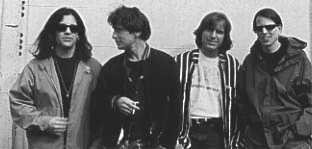
All this attention lead to several reissues and compilations. In 1993 Big Star even starts a short tour in the U.S., Europe and Japan. They play on the "Reading Festival" in the UK and the Dutch "Campflight To The Lowlands" a.o.. Alex Chilton and Jody Stephens are assisted by fans Ken Stringfellow and Jon Auer of The Posies. Matthew Sweet, also a fan and a gifted musician, didn't take the challenge. The first performance of this line-up is released the same year. It's audible that the band had hardly rehearsed but "Live At Missouri University 4/25/93" definitely has it's moments.

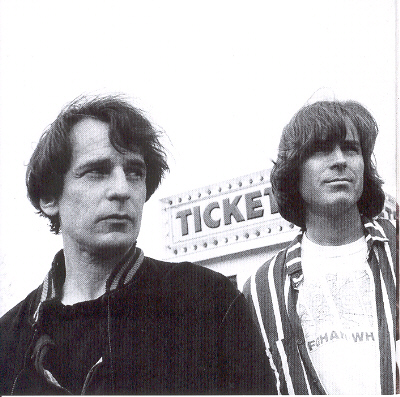
Performances by this band were irregular however (The Posies were still together). And soon Chilton picked up his erratic solo-career while Jody Stephens focused on Ardent Records and played with Americana supergroup Golden Smog which included Gary Louris (The Jayhawks) and Jeff Tweedy (Wilco). In '97 and '99 several Big Star cd's were released with outtakes and live-material. Norton Records' release "Nobody Can Dance" is one of the more interesting releases because it contains rehearsals for the WLIR-FM concert they played in '74. Surprisingly, or typically, Chilton decides to join a reunion of The Box Tops in '97. They even released a new cd in '98, "Tear Off!" was mainly filled with covers. Unfortunately no Chilton originals. From 2001 on Big Star started playing concerts again. Eventually, after several of years of speculation, this resulted in the release of a brand new cd. "In Space" (Rykodisc 2005) is an enjoyable release. It never reaches the heights of the original Big Star albums but that couldn't be expected anyway. It sounds more like a Chilton solo record than a Big Star album. The contributions by Stephens and Stringfellow are the ones that really sound like Big Star.
In 2009 Rhino records release a 4 cd box set, "Keep An Eye On The Sky". Although it doesn't offer a lot of surprises, for the 20 selections of their performance at Lafayette's Music Room (Memphis, TN, January 1973) alone it is worth purchasing. You'd wish they released all of the recordings for this performance separately but nonetheless this is the box set the band deserved.
In March 2010 fans are shocked to hear that Alex Chilton dies at the age of 59 from a heart attack. Chilton had been scheduled to perform with Big Star on Saturday night, part of a headlining set at Antone's nightclub, and the group was also set to be the subject of a historical panel earlier in the day. After consulting with Chilton's wife and festival organizers, surviving Big Star members Jody Stephens, Jon Auer and Ken Stringfellow confirmed that the panel and performance would go on as scheduled, effectively serving as memorials for Chilton. Andy Hummel appeared on a panel celebrating the band and later joined the surviving members of Big Star on stage as a guest, marking his first time playing with the group in 35 years. "When some people pass, you say it was the end of an era. In this case, it's really true," said Van Duren, a fellow Memphis musician (check "Are You Serious", 1977) who knew Chilton for decades. "It puts an end to the Big Star thing, and that's a very sad thing."
Incredibly, only 4 months later Big Star lost founding bassist Andy Hummel too. He died (59) at his home in Fort Worth, Texas, after a long battle with cancer. This leaves Jody Stephens as the only surviving founding member. An unexpected early end to one of the most influential rock bands from the 70's. A band that deserves all the praise it can get. Best thing to do is to play their music again. Jody Stephens must've had similar thoughts and did several shows featuring The Posies and several other Big Star friends.
Although Big Star never reached any chart, the band's huge cult-status keeps reaching new fans. Big Star could've followed idols The Beatles and The Byrds in their footsteps but unfortunately not every great band makes it. The mix of melodious popmusic with ringin' guitars combined with the rockpower of bands like The Who and The Kinks (early) still sounds fresh today and demands to be discovered. In 2014 the band gets the documentary it deserves with "Nothing Can Hurt Me". In December the same year John Fry dies of a cardiac arrest at teh age of 69.
Discography
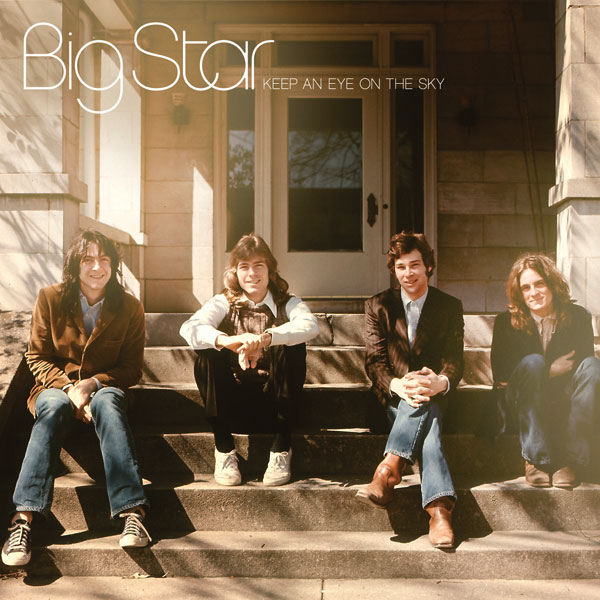
Big Star:
- When My Baby′s Beside Me (7" , Ardent ADA-2902, 1972)
- Don′t Lie To Me/Watch The Sunrise (7", Ardent ADA-2904, 1972)
- #1 Record (LP, Ardent ADS-2803, 1972)
- O, My Soul (7", Ardent ADA-2909, 1974)
- Radio City (LP, Ardent ADS-1501, 1974)
- September Gurls (7", Stax STAX504, 1978)
- #1 Record/Radio City (2LP, Stax/EMI 302, 1978)
- Third (LP, PVC 7903, 1978 (14 songs)
- Kizza Me/Dream Lover (7", Aura AUS 103, 1978)
- Jesus Christ (7", Aura AUS 107, 1978)
- The Third Album (LP, Aura AUL 703, 1978 (12 songs))
- #1 Record (LP, Line/Big Beat 1986)
- Radio City (LP, Line/Big Beat 1986)
- #1 Record/Radio City (CD, Line LICD 9.00465 O, 1990 (Note. version with all 24 songs))
- September Gurls EP (12", Line 1987)
- Sister Lovers (The Third Album) (LP, Dojo LP 55, 1987)
- The Third Album (CD, Line 1987 (17 songs))
- Big Star's Biggest (CD, Line 900509, 1987)
- Third/Sister Lovers (CD, Rykodisc RCD 10220, 1992 (19 songs))
- Live (CD, Rykodisc RCD 10221, 1992)
- Mine Exclusively / Patti Girl (7", NME FAN 1, Big Star & Teenage Fanclub, 1993)
- Live At Missouri University 4/25/93 (CD, Zoo/Volcano 11060, 1993)
- Beale Street Green (CD, Sykodisc SCD1022X, 1997, (incl. solo-stuff Alex Chilton))
- September Gurls/The Letter (7", Norton Records 45-079, 1999)
- Nobody Can Dance (CD, Norton Records CED-265, 1999)
- The Best of Big Star (CD, Ace 197 1992/Big Beat CDWIKK 197, 1999)
- What's Goin' Ahn (Bootleg CD, Deep Six 38, 2001)
- Big Star Story (CD, Rykodisc 10640, 2003)
- Extended Versions (CD, BMG Special Products 48764, 2004)
- In Space (CD, Rykodisc 10677, 2005)
- Keep An Eye On The Sky (4CD, Rhino B002BFO8HS, 2009)
- Nothing Can Hurt Me (DVD, Magnolia Home Entertainment, 2014)


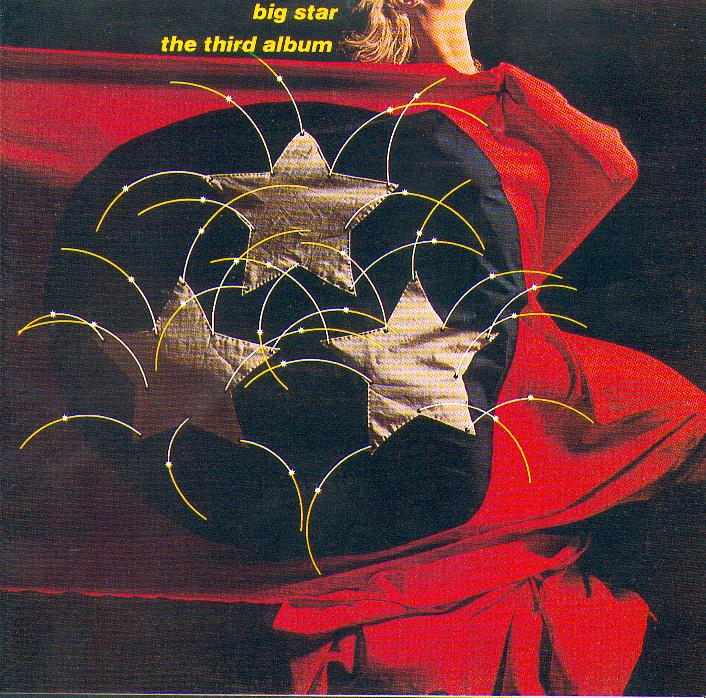



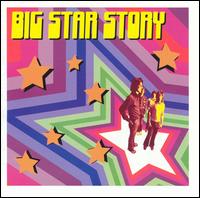
Rock City:
- Rock City (CD, Lucky Seven CD9209, 2003)
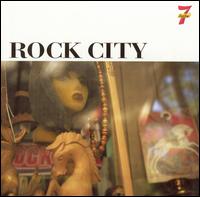
Chris Bell:
- I Am The Cosmos/You And Your Sister (7", Car Records CRR6, 1978)
- I Am The Cosmos (CD, Rykodisc RCD 10222, 1992)
- I Am The Cosmos (De Luxe edition 2CD, Rhino, 2014)
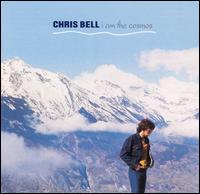
Alex Chilton:
- Bach's Bottom (LP, Razor & Tie Music, 1975/CD, Line Records, 1981)
- One Day In New York (LP, Ork Records ORK1/Trio Records AW-2007, 1977)
- Singer Not The Song (7" EP, Ork Records ORK81978, 1978)
- Bangkok/Can't Seem To Make You Mine (7", Fun, 1978)
- Like Flies On Sherbert (CD, Peabody/Great Expectations PIP CD 038, 1980 (reissue 1992))
- Live In London (CD, Fuel 2000 Records, 1980)
- Hey Little Child/No More the Moon Shines on Lorena (7", Aura 1980)
- Like Flies On Sherbert/Live In London (CD, See For Miles Records, 1980)
- Feudalist Tarts EP (Big Time 1985)
- Document (LP, Aura 1985 (compilation))
- Stuff (LP/CD, New Rose 1987 (compilation))
- Feudalist Tarts/No Sex (CD, Razor & Tie Music 1985/'86)
- No Sex (12"/2x7", New Rose NEW68/NEW69 1986)
- High Priest (CD, Razor & Tie Music 1986)
- Black List (CD, New Rose NEW194CD 1989)
- 19 Years: An Alex Chilton Collection (CD, Rhino Records 1991)
- Clichés (CD, Ardent Records 1994)
- A Man Called Destruction (CD, Line Records RRCD 9.01312 1995)
- 1970 (CD, Rev-Ola CREV044CD 1996)
- Top 30 (CD, Last Call 1997)
- Bangkok/Can't Seem To Make You Mine (7", Munster Records REF.7113 1999)
- Singer Not The Song (7", Munster Records REF.7127 1999)
- Set (CD, Bar/None 2000)
- Live In Anvers (CD, Last Call/Rykodisc 2004)
- Free Again: The 1970 Sessions (CD, Omnivore, 2012)
- Electricity by Candlelight: NYC 2/13/97 (CD, Bar/None records. 2013)
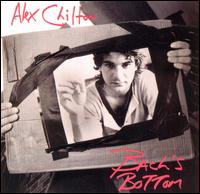
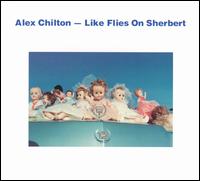

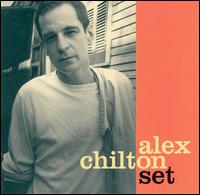

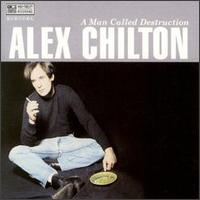
The Box Tops:
- The Letter/Neon Rainbow (Bell, 1967, Sundazed CD6158, 2000)
- Cry Like A Baby (Bell, 1968, Sundazed CD6159, 2000)
- Non-Stop (Bell, 1968, Sundazed CD6160, 2000)
- Dimensions (Bell, 1968, Sundazed CD6160, 2000)
- A Lifetime Believing (Cotillion, 1971. Note. Without Alex Chilton)
- Tear Off! (Last Call, 1998)

Sources

Related sites and articles
